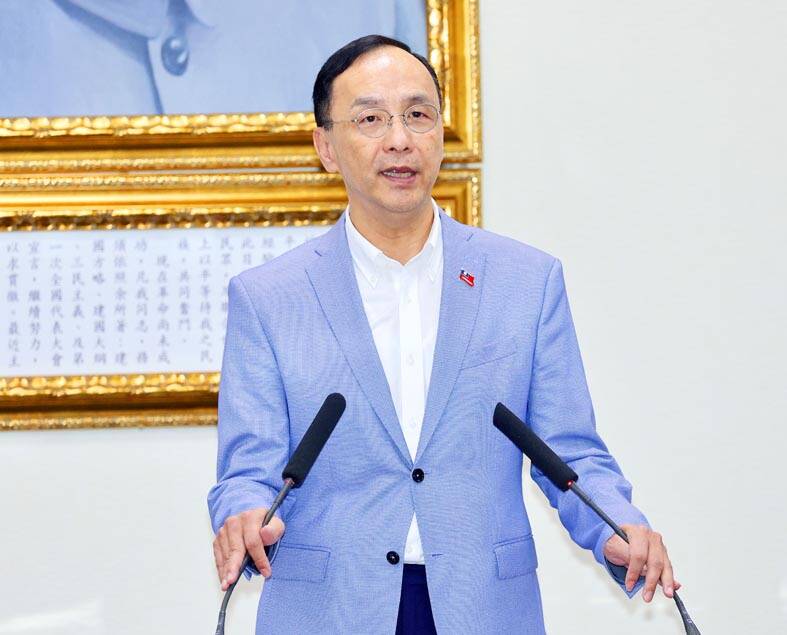Chinese Nationalist Party (KMT) Vice Chairman Andrew Hsia (夏立言) is to lead a delegation to China tomorrow to take part in a two-day conference in Jiangxi Province, the party said yesterday.
The visit aims to foster cross-strait cultural and economic exchange, it said in a statement.
KMT Mainland Affairs Department head Lin Chu-chia (林祖嘉) and representatives from the commercial sector would also be in the delegation, it said.

Photo: CNA
The cross-strait conference on economics, trade and cultural exchange is a regular activity that is of great value to the commercial industry, the KMT said.
Unofficial exchanges help avoid escalation, especially during a time of tense relations across the Taiwan Strait, it said.
Hsia is to travel to China’s Guiyang for a similar conference on Monday next week, while KMT Secretary-General Justin Huang (黃健庭) is to visit Shandong for a separate exchange activity on Tuesday, the party said.
Meanwhile, KMT Chairman Eric Chu (朱立倫) yesterday told a news conference about US-China ties that the party hopes regional tensions could be eased through dialogue with Beijing.
US National Security Adviser Jake Sullivan arrived in the Chinese capital on Tuesday to meet with Chinese Minister of Foreign Affairs Wang Yi (王毅).
The New York Times on Tuesday reported that the meeting “could lay the groundwork for one last summit between [Chinese President] Mr Xi [Jinping, 習近平] and [US President] Mr [Joe] Biden.”
Comparing Sullivan’s visit to the KMT’s policy of rapprochement with China, Chu said that the party “resolves issues, including the Kinmen incident and cross-strait tourism, through exchanges and dialogue,” referring to the drowning deaths of two Chinese fishers whose boat capsized in waters near Kinmen County on Feb. 14 while being pursued by a Coast Guard Administration vessel.
Chu compared his party’s approach to China with that of the Democratic Progressive Party (DPP), saying that the DPP does not want to communicate with Beijing.
The DPP relied on the US and the KMT to hold exchanges and dialogue with China in its place while gaining political benefits through conflict with China, he said.
“The DPP is engaged in resistance, replacing dialogue with confrontation and using that confrontation as a political cash machine,” he said.
However, issues between Taiwan and China could not be solved solely through the US’ strategic dialogue with Beijing, he said.
Hsia’s and Huang’s visits “are very important forums for Taiwanese businesspeople, and important opportunities for cross-strait exchanges and dialogue,” he said. “The DPP is full of malicious criticism, but the KMT will always insist on doing the right thing and seeking the best interests of Taiwanese.”
Chu also commented on the government’s budget for next year, which hit a record NT$3.13 trillion (US$97.97 billion) , including a defense budget of NT$647 billion, or 2.45 percent of GDP.
“No matter how high the general budget and defense budget are, Taiwan’s security cannot be ensured without exchanges and dialogue,” he said, adding that the KMT would “strictly supervise the budget” at next week’s legislative session.
When the DPP had a legislative a majority, it approved unnecessary spending, including “improper purchases” and wasteful use of public funds, he said.
“The KMT would strongly supervise the legislature and will not allow anyone’s hard-earned money to be wasted,” he added.

The first global hotel Keys Selection by the Michelin Guide includes four hotels in Taiwan, Michelin announced yesterday. All four received the “Michelin One Key,” indicating guests are to experience a “very special stay” at any of the locations as the establishments are “a true gem with personality. Service always goes the extra mile, and the hotel provides much more than others in its price range.” Of the four hotels, three are located in Taipei and one in Taichung. In Taipei, the One Key accolades were awarded to the Capella Taipei, Kimpton Da An Taipei and Mandarin Oriental Taipei. Capella Taipei was described by

EVA Airways today confirmed the death of a flight attendant on Saturday upon their return to Taiwan and said an internal investigation has been launched, as criticism mounted over a social media post accusing the airline of failing to offer sufficient employee protections. According to the post, the flight attendant complained of feeling sick on board a flight, but was unable to take sick leave or access medical care. The crew member allegedly did not receive assistance from the chief purser, who failed to heed their requests for medical attention or call an ambulance once the flight landed, the post said. As sick

The Taichung District Court yesterday confirmed its final ruling that the marriage between teenage heir Lai (賴) and a man surnamed Hsia (夏) was legally invalid, preventing Hsia from inheriting Lai’s NT$500 million (US$16.37 million) estate. The court confirmed that Hsia chose not to appeal the civil judgement after the court handed down its ruling in June, making the decision final. In the June ruling, the court said that Lai, 18, and Hsia, 26, showed “no mutual admiration before the marriage” and that their interactions were “distant and unfamiliar.” The judge concluded that the couple lacked the “true intention of

A drunk woman was sexually assaulted inside a crowded concourse of Taipei Railway Station on Thursday last week before a foreign tourist notified police, leading to calls for better education on bystander intervention and review of security infrastructure. The man, surnamed Chiu (邱), was taken into custody on charges of sexual assault, taking advantage of the woman’s condition and public indecency. Police discovered that Chiu was a fugitive with prior convictions for vehicle theft. He has been taken into custody and is to complete his unserved six-month sentence, police said. On Thursday last week, Chiu was seen wearing a white